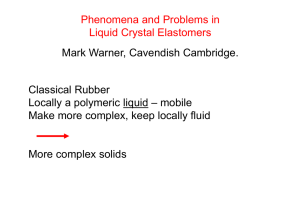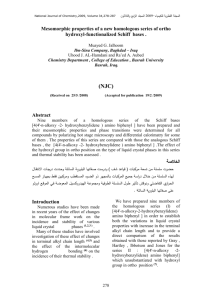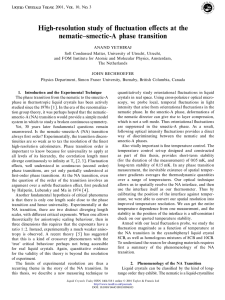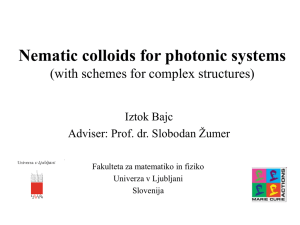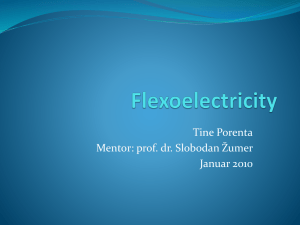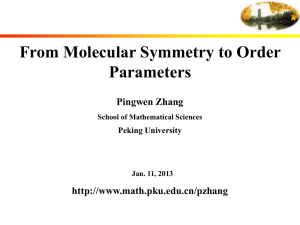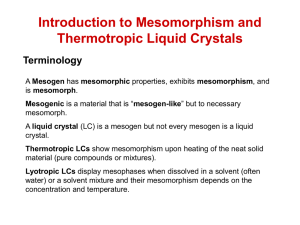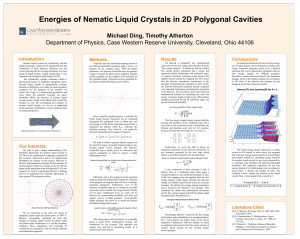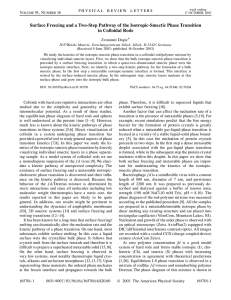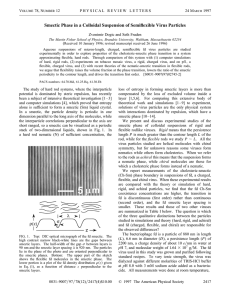Smectic C 相液晶的分子排列。
advertisement
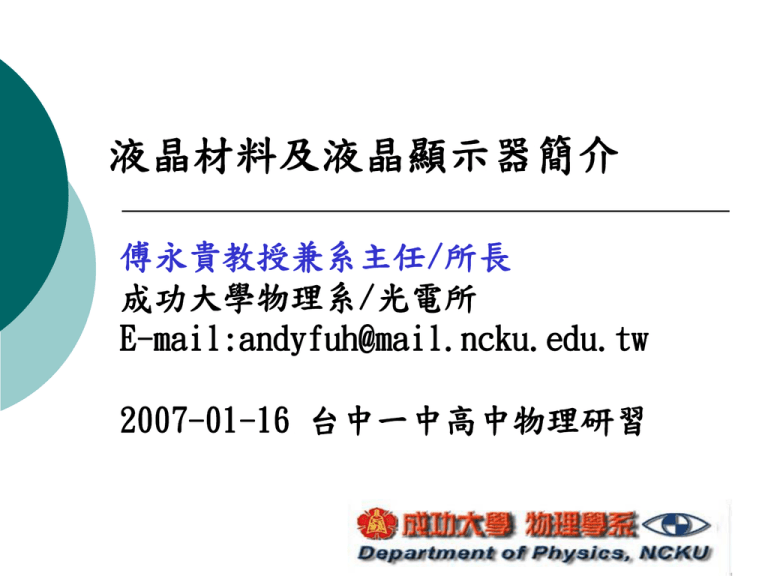
液晶材料及液晶顯示器簡介 傅永貴教授兼系主任/所長 成功大學物理系/光電所 E-mail:andyfuh@mail.ncku.edu.tw 2007-01-16 台中一中高中物理研習 (綱要)Outlines 簡介 ˙市場 ˙液晶簡介 液晶光學性質 液晶顯示器模式 簡介 LCD結構圖 Or 3M DEBF Twisted Nematic Liquid Crystal Displays Color Filter Conducting Layer (ITO) Alignment Layer Backlight TFT: Thin Film Transistor 2004年我國大型TFT產值比較 2004年全球大型TFT產值約346億美元,而我國產值較前一年成 長67%,估計佔全球比重約38%,僅次於韓國45%;另外,日本 約佔17%,排名第三(圖一)。 2004年我國中小型TFT產值比較 2004年全球中小型TFT產值約102億美元,而我國產值較前一 年成長140%,估計佔全球比重約12%,次於韓國78%,而日本 約佔10%,排名第三。 我國大型TFT廠商營利表現比較 韓國大型TFT廠商營利表現比較 (綱要)Outlines 簡介 ˙市場 ˙液晶簡介 液晶光學性質 液晶顯示器模式 物質的相變 何謂液晶? 對於一般常見的物質由結晶狀的固體(Crystalline Solid)相變為各 向同性的液體(Isotropic Liquid),通常是經由單一過程的相變。但有 很多有機物由結晶固體到各向同性液體間卻需要經過多個步驟的相 變。因此必定存在一個或多個介於結晶固體與各向同性液體間的中 間相(Mesophases)。由於這些中間相的分子次序是介於結晶固體與各 向同性液體間,所以這些相的力學、光學性質和對稱性也介於結晶 固體與液體之間。 到目前為止,已被發現的這些中間相大致可被區分成兩大類別: (1) Disordered Crystal Mesophases: 一般稱之為「塑性晶體」 (Plastic Crystals)。其分子形狀常為圓球狀(Globular),故易形成分子位置 有次序性,但方向無次序性的相。因其分子位置仍保留三維晶格 排列,故不具流動性。 (2) Ordered Fluid Mesophases: 通常稱為「液態晶體」 (Liquid Crystals)簡稱液晶。由於此相常由長條狀(Rodlike)或圓盤狀(Dise-like)的分子所組成。故易形成一分 子重心位置無次序性,但方向有次序性的相。由於此 相分子重心位置不受限於晶格[位置無序],故具有一定 程度的流動性。 由上述可知,這些中間相的分子形狀是決定其物性 的重要因素。 結晶固體溶解:晶格位子, 方向 在此我們僅對本課程相關的液晶作更進一步地介紹。 結晶狀的固體 (Crystalline Solid) 各向同性的液體 (Isotropic Liquid) 中間相 (Mesophases) Disordered Crystal Mesophases 「塑性晶體」 Ordered Fluid Mesophases 「液態晶體」 圓球狀 長條狀、圓盤狀 位置有序,方向無序 位置無序,方向有序 晶格排列,不具流動性 位置無序,有流動性 液晶的分類 以產生相變之原因來區分 1) Thermotropic (熱致液晶) 因溫度的改變而產生相變 2) Lyotropic (溶致液晶) 因溶於溶劑中濃度比例的改變而產生相變 分子形狀 a) 長條狀 Thermotropic (熱致液晶) 排列方式 1. Nematic (向列相) 2. Cholesteric (膽固醇相) 3. Smectic (近晶相) b) 圓盤狀 1. Columnar (柱狀相) 2. Nematic Classification of liquid crystal: Based on their symmetry of molecular arrangements, liquid crystals are divided into three major classes: (1) Nematic Phase (向列相) (2) Cholesteric Phase (膽固醇相) A distorted form of the nematic phase (1) Smectics (近晶相) Liquid Crystals (LCs) Solid LC mesophases Smectic C Crystalline Tm Smectic A Liquid Nematic Isotropic TNI Temp. Nematic 液晶 Nematic 液晶特性: (a) 分子的重心位置沒有次序性。 (b) 分子的排列方向存在一定程度的次序性,分子傾向平行於某個共同的 方向去排列,如圖所示,我們定義這個方向為導軸 (Director Axis)以 n 表示。 (c) 導軸的方向在空間中是任意的。 (d) 導軸 n 與 – n 的狀態是不可區分的。 n 長條狀之Nematic相液晶的分子排列。 Cholesteric 液晶 將Chiral溶解在Nematic相液晶中,原來的Nematic液晶結構會出現 螺旋畸變。我們將這種螺旋的Nematic相稱為Cholesteric相。 z n n L n y x n nx = cos(qo z + φ) ny = sin(qo z + φ) nz = 0 qo > 0 表液晶分子為右旋排列, qo < 0 表液晶分子為左旋排列。 螺距(Pitch) = 2L Cholesteric 相液晶的分子排列。 因為n與-n是不可區分的,所以其週期等於半螺距,即L = π / |qo| The Chiral Nematic Ordinary Nematic Chiral Nematic CN CN director pitch n P Chirality H H H H H C N H-C-C-C-C-C H H H H H non-chiral H H H H H C N H-C-C-C-C-C CH3 H H H H mirror images chiral (RH) The methyl group on the 2nd carbon atom on the alkyl chain of the molecules extends out of the plane of the paper and the hydrogen atom extends into the plane of the paper. Therefore the 2nd carbon can be thought of as a right or left handed coordinate system Smectic 液晶 由結構上的差異Smectic液晶又可被細分成Smectic A、B、C....等 共十餘種。但結構上看,所有的Smectics相都具有層狀結構,層與層 之間的距離是一定的,層間距可以用X-ray繞射方法來量測。由此可 見Smectics的之次序性比Nematics高。對於任何俱備此兩種相的材料 而言,其Smectic相的溫度範圍總比Nematic相為低。 (a) Smectic A (SmA) 每一層內,分子位置沒有次序性。 在光學上具單光軸特性,其光軸 方向與層平面垂直。 (b) Smectic C (SmC) 光學上是屬於雙光軸(Optically Biaxial),其中一光軸沿液晶導 軸方向,另一為垂直層面方向。 w d d Smectic A 相液晶的分子排列。 Smectic C 相液晶的分子排列。 (c) Smectic C* (SmC*) 與Smectic C相似其分子導軸之方向與層面法線方向有一夾角w。 但相鄰之液晶層的分子導軸會沿著層面法線作緩慢之螺旋轉動,如圖 所示。此結構之形成通常可由Smectic C之液晶再加入光學活性分子或 chiral agent所形成。故又名為chiral smectic C。 d Smectic C* 相液晶的分子排列。 外加電場對 nematic 相的影響 對一 nematic 相液晶外加一電場 E,其相應的 電位移 D 為 D E // n E n 此時電場對系統之能量貢獻(每 cm3)可寫5 1 2 2 DdE E n E 4 8 8 ˆ 能量最低 ˆ // E // . 0 則 n 液晶分子 // 電場方向 ˆ 能量最低 ˆ E // . 0 則 n 液晶分子 電場方向 液晶之非均向性(Anisotropic) 分子形狀 高度幾何異向性 (長條狀或圓盤狀) 分子排列 秩序性 物理性質 非均向性 介電係數 磁導率 折射率 黏滯係數 由於液晶分子之形狀具有高度幾何異向性[長條狀或圓盤狀],導 致其分子之排列方向具有秩序性,此一異於各向同性(isotropic)液 體的特性亦表現在電性、磁性、光學及力學等各方面。當量測其介電 係數(dielectric constant)、磁導率(magnetic susceptibility)、 折射率(refractive index)及黏滯係數(viscosity)…等時,將因液 晶分子排列方向不同而有所差異。 (綱要)Outlines 簡介 ˙市場 ˙液晶簡介 液晶光學性質 液晶顯示器模式 Phase shift in a birefringent material E-wave O-wave Phase retardation Δn= ne-no>0 正單光軸 Δ=e-o =2 πd ( 1/λe-1/λ0) =2πd(ne-no)/ λv =2πdΔn/λv Important parameter Δn= ne-no<0 負單光軸 Tipping the director by the angle Ө E-wave O-wave Birefringence of LC ITO Glasses Index Ellipsoid: x2/no2 + y2/no2 + z2/ne2 = 1 ( For an uniaxial crystal: nx=ny=no, nz= nene) z (optical axis) Ex k Ey Inclined plane ne ITO Glasses O n Ez 45o Ex k x=x’ d =2nd/=π/2 =2nd/=π/2 z’ no y y’ neff ()none/(no2sin2 + ne2cos2 )1/2 o (綱要)Outlines 簡介 ˙市場 ˙液晶簡介 液晶光學性質 液晶顯示器模式 LC mode? LCD Modes Source: Sharp SURVEY OF LIQUID CRYSTAL DISPLAY MODES 1. 2. 3. Birefringence mode Dichroic Dye mode Scattering mode Birefringence Mode ▬ TN , STN (Polarization Rotation ) ▬ ECB-electrically controlled birefringence (or phase retardation) – VA, IPS, HC, Chiral-VA ▬ FLC-Ferroelectric LC ▬ Mixed mode Twisted Nematic Liquid Crystal Displays Color Filter Conducting Layer (ITO) Alignment Layer Backlight A Twisting Nematic (扭曲型LCD ) Normally Black : P//A V=0 , Dark State Normally White : P⊥A V=0 , transparent State TN-LCD作法 1. 2. 3. 4. 5. ITO- cotaed glass Alignment layer (spin coating) Baking RubbibgPretilt~20避免reverse tilt Cell thickness? Rubbing It depends on the birefringence ∆n of LC For 900 TN-LCD between two parallel ideal polarizers (normally Black mode), the transmission is (unpolarized monochromatic) Transmission of TN LCDs --- NB mode 2 π 2 sin 1 u 2 1 sin X 1 2 T 2 2 X2 2 1 u2 (Gooch and Tarry) Γ Δn u 2d 2 λ Where: X2 = 2 + 2/4 = 2nd/ = /2 if T 0 , (Minimum conditions) u 3 , 15 , 35 , 63 Transmission of TN LCDs --- NW mode π sin 2 1 u2 1 1 2 T 2 2 1 u2 (Gooch and Tarry) Γ Δn u 2d 2 λ Where: = 2nd/ = /2 1 , (Maximum conditions) 2 u 3 , 15 , 35 , 63 if T ∆n.d=0.48m, 1.09 m or 1.68 m 選LC ∆n已知 d可知 6.Nematic LC+少許chiral component 避免reverse twist 7.灌充即可 Typical cell gap for TN LCDs First minimum condition : Δn u 2d 3 λ 3λ 3(550nm) d 5000nm 5 μ m 2Δn 2(0.095) 5 m is a typical cell gap for first minimum TN LCDs TN LCDs ---- threshold voltage Using the previous equations, one can derive the redistribution of the director in a TN cell requires a threshold voltage give by 1/2 K 33 2K22 1 4K11 K11 Vth π ε o Δε 90 T For most nematic mixtures formulated for TN displays, Vth is typically around 1 V. 100 80 60 40 TN LCD (NW) T-V curve 20 0 0 Vth 0.5 1 1.5 2.0 V TN LCDs ---- Contrast Ratio →Commonly used Performance of TN-LCD standard products Viewing angle needs to improve: will discussed later (2) STN: twisting angle 180o-270o STN & TN : Twisting angle ↑ , E-O curve sharpness ↑ → multiplexing capability ↑, but Gray scale more difficult Multiplexing Capability : Number of multiplexing lines N vs Selection ratio Electrically controllable birefringence (ECB) (or phase retardation mode) VA (Vertical Alignment) <0 = // I I 0 sin 2 2 sin 2 R Θ=45o where R=d n (T, ) sin 2 E n V,T, effective LC birefringence LC ň 投影 Performance of MVA-LCD Fujitsu products MVA: Multi-domain VA (wide view angle) IPS (In-Plane Switching) 之操作原理 (Phase retardation mode) NB Mode 出射光 解偏版 出射光之 極化狀態 玻璃基板 作用電場方向 液晶分子 (<0) 作用電極 偏光版 入射光 未加電場 "OFF" 狀態 施加電場 "ON" 狀態 Optical Switching of Surface Stabilized Ferroelectric Liquid Crystal (SSFLC) (Phase retardation mode) Surface interactions can be used to unwind the spontaneous helix, which yields a uniform FLC alignment with Fast response Bistability Wide viewing angle (IPS) SSFLCs ‧Book shelf structure Rubbing direction LC molecule 2.Dichroic Dye Liquid Crystal Displays Dichroic dye molecule A∥: Elight ∥ A⊥: Elight ⊥ a a , absorb light , do not absorb light • Heilmeier dichroic display • Quarter wave dichroic display • Phase change dichroic display A Dichroic Ratio (DR) , DR Ⅱ A Research Topics in TFT-LCDs 1) 2) 3) 4) 5) 6) 廣視角 快速應答 大面積製程 新背光源 可撓曲:類紙式 TFT製程及材料
